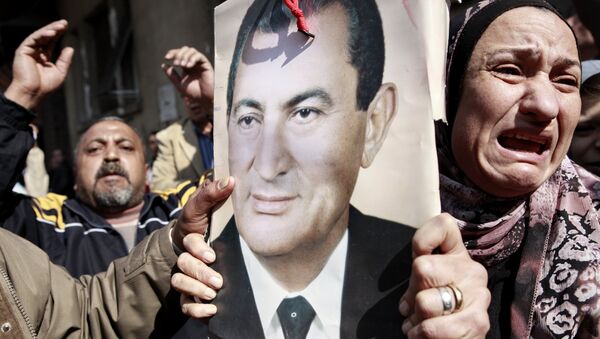Egyptian President Hosni Mubarak, 82, who ruled the country for almost 30 years, stepped down on Friday after 18 days of heated protests demanding his resignation.
The unrest claimed the lives of at least 300 people and injured thousands. The majority of protestors behind the revolution are web-savvy young people who have not seen any other regime except for Mubarak's.
"In these difficult circumstances the country is facing, President Hosni Mubarak has decided to leave his post and instructed the Higher Military Council to rule the country," Prime Minister Omar Suleiman said during a one-minute announcement on national TV.
After the announcement, Cairo's Tahrir Square, the epicenter of the nationwide protests, erupted into loud cheers, chanting "Egypt is free, Egypt is free!"
The main accusations against Mubarak are that his regime fostered poverty, autocracy and large-scale corruption. According to opposition, the main goal of Egypt's revolution is to replace Mubarak's regime with a true democracy.
The unexpected resignation made Mubarak, who said on Thursday he would remain in office, the second Arab leader forced to quit from a civil uprising. Last month, Tunisia's president Zine al-Abidine Ben Ali resigned and fled the country amid massive protests against his regime.
Egyptian national TV reported that Mubarak and his family had left Cairo for his winter residence in Sharm el Sheikh, a popular resort in South Sinai.
TRANSFER OF POWER
"The Higher Military Council is not an alternative to the legal power that would please the Egyptian people," the statement read.
The Higher Military Council also said it would make a number of announcements in the near future on governing the country.
The Higher Military Council expressed its appreciation to Mubarak for his contribution to strengthening and developing the country.
"We address with special thanks and appreciation to President Hosni Mubarak for his guarding of the highest national interests, in the days of peace and war, and for his contribution to affairs of the fatherland," the statement read.
POSSIBLE REFUGE IN UAE
The Kuwaiti Al-Qabas daily said on Friday Mubarak agreed to resign following a meeting with United Arab Emirates Foreign Minister Sheikh Abdullah Bin Zayed Al Nahyan, who offered the Egyptian president refuge in the city of Al Ain (UAE).
According to Al-Qabas, the UAE foreign minister said his country could help Mubarak in three areas, including holding talks on organizing safe passage for Mubarak and his security forces out of the country, guaranteeing he or his family members would not be legally persecuted, and his personal property would not be confiscated.
Mubarak may travel directly to Al Ain or first go to Germany for medical treatment, the daily said.
WORLD REACTION
Officials around the world hurried on Friday to welcome the end of yet another autocratic regime and pledged to help Egypt make a peaceful transition to democracy.
U.N. Secretary-General Ban Ki-moon said in a statement that this transition should meet the "legitimate aspirations of the Egyptian people and includes free, fair and credible elections leading to the early establishment of civilian rule."
EU president Herman Van Rompuy, foreign policy chief Catherine Ashton and head of European Commission Jose Manuel Barroso said in a joint statement that the EU "salutes the courage of the Egyptian people" and also called for the formation of a civilian government.
U.S. President Barack Obama praised the will of the Egyptian people, but warned that Mubarak's resignation was just the beginning of the road toward democracy in Egypt.
"The people of Egypt have spoken," Obama told reporters. "Egyptians have made it clear that nothing less than genuine democracy will carry the day."
However, he said, "there will be many difficult days ahead and many questions remain unanswered."
Russian Foreign Minister Sergei Lavrov said "we hope that all the latest events will help to reestablish stability, will ensure the normal functioning of all authoritative bodies and that not only structures of the current government but also opposition powers will express their readiness to stabilize the situation."
CAIRO, February 12 (RIA Novosti)


